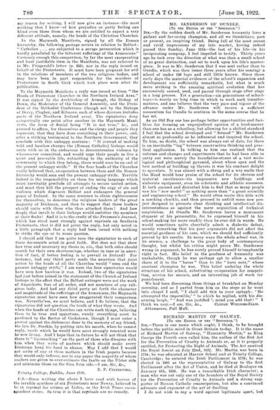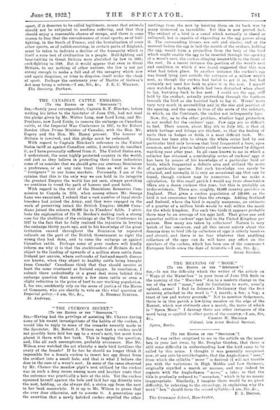RICHARD MARTIN OF GALWAY.
[To THE EDITOR or THE " SPECTATOR."]
Sirt,—There is one name which ought, I think, to be brought before the public mind in Great Britain to-day. It is the name of Richard Martin of Galway, " Humanity Martin," as King George the Fourth once called him, the author of the first Act for the Prevention of Cruelty to Animals or, as it is properly entitled, for Protecting the Right of Animals. The Act received the Royal Assent on July 22nd, 1822. Mr. Martin was born in 1754; he was educated at Harrow School and at Trinity College, Cambridge; lie entered the Irish Parliament in 1776; he was elected in 1801 as the representative of Galway to the first Parliament after the Act of Union, and he died at Boulogne on January 6th, 1834. He was a remarkable Irish character; a man who was not only one of the founders of the Royal Society for the Prevention of Cruelty to Animals and a strong sup- porter of Roman Catholic emancipation, but also a convinced advocate and exponent of the art of duelling.
I do not wish to say a word against legitimate sport, but sport, if it deserves to be called legitimate, means that animals should not be subjected to needless suffering, and that they should enjoy a reasonable chance of escape, and there is some reason to fear that the recrudescence of cruel sports, as of bull- fighting, in the South of France, and the brutalization of some other sports, as of rabbit-coursing, in certain parts of England, must be taken to indicate a decline of the humanity which is itself a sure test of civilization in a people. Bull-fighting and bear-baiting in Great Britain were abolished by law in 1835; cock-fighting in 1849. But it would appear that even in Great Britain, to say nothing of other nations, the law is not yet strong enough to make a full end of the savagery which now and again disguises, or tries to disguise, itself under the cloak of sport. Perhaps the centenary year of Martin of Galway's Act may bring a reform.—I am, Sir, &c., J. E. C. Wessnox. The Deanery, Durham.



































 Previous page
Previous page